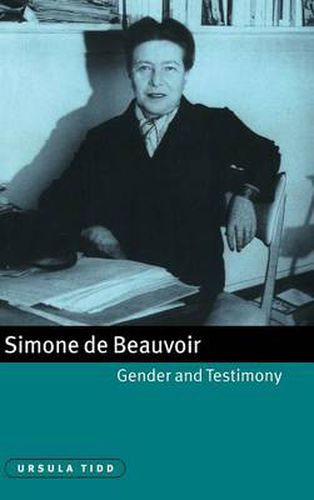Readings Newsletter
Become a Readings Member to make your shopping experience even easier.
Sign in or sign up for free!
You’re not far away from qualifying for FREE standard shipping within Australia
You’ve qualified for FREE standard shipping within Australia
The cart is loading…






This is the first full-length study to explore Simone de Beauvoir’s autobiographical and biographical writings in the context of ideas on selfhood formulated in Le deuxieme sexe and her other philosophical essays of the 1940s. Drawing on recent work in autobiographical studies and working within a broadly Foucauldian framework, Ursula Tidd offers a detailed analysis of Beauvoir’s auto/biographical strategy as a woman writer seeking to write herself into the male-constructed autobiographical canon. Tidd first analyses Beauvoir’s notions of selfhood in her philosophical essays, and then discusses her four autobiographical and two biographical volumes, along with some of her unpublished diaries, in an attempt to explore notions of selectivity, and the politics of truth-production and reception. The study concludes that Beauvoir’s vast auto/biographical project, situated in specific personal and historical contexts, can be read as shaped by a testimonial obligation rooted in a productive consciousness of the Other.
$9.00 standard shipping within Australia
FREE standard shipping within Australia for orders over $100.00
Express & International shipping calculated at checkout
Stock availability can be subject to change without notice. We recommend calling the shop or contacting our online team to check availability of low stock items. Please see our Shopping Online page for more details.
This is the first full-length study to explore Simone de Beauvoir’s autobiographical and biographical writings in the context of ideas on selfhood formulated in Le deuxieme sexe and her other philosophical essays of the 1940s. Drawing on recent work in autobiographical studies and working within a broadly Foucauldian framework, Ursula Tidd offers a detailed analysis of Beauvoir’s auto/biographical strategy as a woman writer seeking to write herself into the male-constructed autobiographical canon. Tidd first analyses Beauvoir’s notions of selfhood in her philosophical essays, and then discusses her four autobiographical and two biographical volumes, along with some of her unpublished diaries, in an attempt to explore notions of selectivity, and the politics of truth-production and reception. The study concludes that Beauvoir’s vast auto/biographical project, situated in specific personal and historical contexts, can be read as shaped by a testimonial obligation rooted in a productive consciousness of the Other.